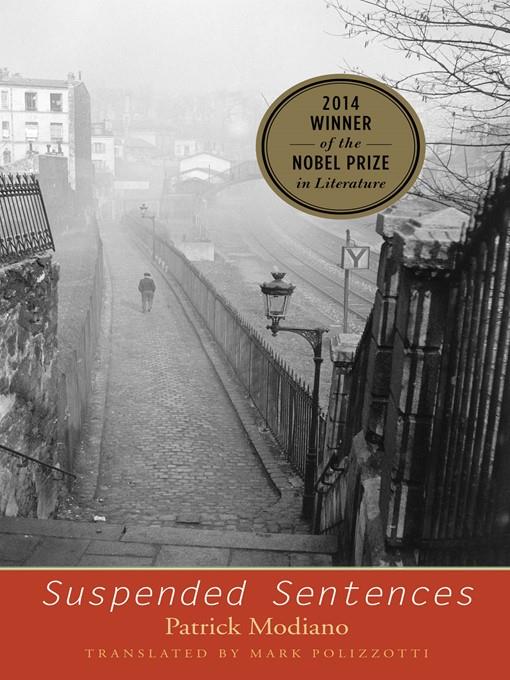
Suspended Sentences
Three Novellas
کتاب های مرتبط
- اطلاعات
- نقد و بررسی
- دیدگاه کاربران
نقد و بررسی

October 20, 2014
This set of three newly translated novellas from 2014 Nobel winner Modiano is propitious in timing and format: the collectionâs variety gives curious readers a broad introduction to a writer of purposefully narrow scope. Modiano has facetiously admitted to repeatedly writing the same book, usually a meditative investigation winding its ways through the City of Lights to illuminate, though never fully reveal, some lingering mystery from the period of Nazi Occupation. These three atmospheric novellas demonstrate the range of reading pleasure afforded by Modianoâs approach and the dark romance of his Paris, a city âin which adventure lay right around every street corner.â âAfterimage,â the tautest, most affecting work, is a shadowy tale in which a young writer obsessively catalogs the work of a haunted photographer who âdid everything he could to be forgotten.â The title novella, a childâs eye view of the colorful gang of ex-circus performers and crooks who helped raise him, relates the boyâs sense of wonder and confusion amid his charmed, if sordid, surroundings. In the slackest of the three, âFlowers of Ruin,â a sensationalist double suicide case occasions a murky investigation into the gangsters and collaborators who sported âstrange names and fake noble titlesâ during the Occupation. Each first-person novella is also a portrait of the artist: as the protagonists pursue the faint traces of people and places that have disappeared, we witness a doggedly inquiring writer slowly emerging before our eyes.

Starred review from December 1, 2014
"One meets the strangest people in one's life." Indeed, and so it is in this somber trilogy of novellas from the recent French Nobel Prize winner.Modiano's work is unknown to most North American readers, and this is as good an introduction as any. The stories here highlight his concerns as a chronicler of the Occupation years and the lean times leading up to 1968; if they were films-and, it should be noted, Modiano is also a screenwriter; co-author, among other things, of the script for Lacombe Lucien (1974)-then Jean-Paul Belmondo would play several leads, always with a Gauloise stuck in his mouth at a moody, meaningful angle. The first story, Afterimage, concerns a mysterious photographer who works the chic world of fashion while maintaining a very private aura; the narrator announces at the beginning that he still knows only a little about Francis Jansen, who "did everything he could to be forgotten...completely dropping out of sight." Jansen is the antithesis of what a swinging fashion photographer is supposed to be, as if Camus had a Rollei slung around his neck-and yet there he is, the owner of "a truth that we've intuited but kept hidden from ourselves, out of carelessness or cowardice." Lean, existentially charged, the title story depicts a boy at the boundary of bourgeois society and the demimonde of the theater and circus, where people bear names such as Little Helene and Snow White and have done some jail time. The Baudelarian title of the last story, Flowers of Ruin, signals that the reader should not expect a light farce, and indeed, a police report figures in the first few pages. In a preface, the translator notes that the stories were published several years apart but cohere nicely, and though they're closely informed by the events of Modiano's life, "it is important to remember that these are fictions." Yes, but fictions with a moral bite, depicting a world in which everyone, it seems, is complicit in crimes not yet specified. Moody, elegant and dour.
COPYRIGHT(2014) Kirkus Reviews, ALL RIGHTS RESERVED.

December 1, 2014
Planned as a February 2015 release but moved up when its author won the Nobel Prize, this volume collects three novellas that are quintessential Modiano. "Afterimages," whose narrator recalls a photographer acquaintance who was not what he seemed; "Suspended Sentences," about a boy raised by friends of his touring actress mother; and "Flowers of Ruin," whose protagonist revisits a site of his youth, where a mysterious double-suicide took place--all concern the uncertainty of memory. The result is elegantly meditative yet remote, a still lake reflecting itself; handy as an introduction to a world figure.
Copyright 2014 Library Journal, LLC Used with permission.

December 15, 2014
Much celebrated in France and winner of the 2014 Nobel Prize, Modiano is little known in the U.S. While his style could not be more different from that of W. G. Sebald, they share a subject: the displaced, people too experienced with the arbitrariness of fate. Modiano focuses on Paris, the fallout from the Nazi occupation, and the legacy of Drancy, the nearby internment camp. All of the characters are, as the title suggests, guilty, and most will be or have already been arrested, in two senses. The narrators (or narrator; they do appear to be the same person) of these linked, autobiographical novellas are conducting investigations like amateur detectives, uncovering facts about each ambiguous figure who attracts their attention. Even Modiano's style, plain but elliptical and carefully wrought, keeps much of the action from view, as Modiano considers the modernization of Paris as a means of forgetting. It's as if all the characters are minor, so little can be known about them. But it is just as likely they have something to hide, even from themselves. Unforgettable.(Reprinted with permission of Booklist, copyright 2014, American Library Association.)

























دیدگاه کاربران